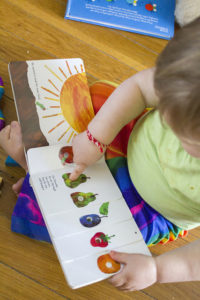
Being an au pair is an important role in a child’s life. When you are caring for young children up to 45 hours per week, there are lots of opportunities to help them learn language. Many host parents are eager for their children to be exposed to more than just English. If this is true of your host parents, you can try the suggestions below, in both English and your native language.
Below are a few tips to start with, for more ideas, check out Ready at Five.
- Read – Read to them daily, point out pictures and ask questions. Even if they can’t answer the questions, this is still modeling conversation.
- Talk – Point out objects around them, names of their body parts, explain what you are doing and places you are going. Long before babies can speak, they benefit greatly from being spoken to.
- Sing – You can sing childhood classics or make up your own silly songs. If you are looking for song ideas, HERE is a great website with lists of songs, lyrics and links to youtube videos* of the songs. Children’s music is also available at the public library and even on iTunes.
- Words – As children move from toddlers to preschoolers begin to point out written language.
- Writing – Toddlers and preschoolers can begin to learn pre-writing skills by drawing with crayons or doing finger paints.
*The American Academy of Pediatrics recommends no screen time for babies under 18 months of age. For children 18 months to 5 years they recommend no more than 1 hour of high quality content. You can play the songs on youtube for the audio and not necessarily show the screen to the child.
Photo: Quinn Dombrowski (Flickr)


 We live in a time of constant sharing through social media. We often share pictures, plans of somewhere we are going or rants about problems, without thinking much about who will see it and what could be the consequences.
We live in a time of constant sharing through social media. We often share pictures, plans of somewhere we are going or rants about problems, without thinking much about who will see it and what could be the consequences. Due to COVID-19, Au Pair in America has temporarily given approval for online/virtual classes, with a few conditions. Au pairs must still produce certificates or other acceptable documentation confirming the completion of the class. Classes must be offered by an accredited U.S. college, university or other post-secondary school and completed by 9/30/21. As of right now, the expectation is that after September, au pairs will resume in-person classes. This is always subject to change, depending on COVID numbers and whether local schools are offering in-person classes. If you have any concerns about in person classes, please contact Christine or Lisa.
Due to COVID-19, Au Pair in America has temporarily given approval for online/virtual classes, with a few conditions. Au pairs must still produce certificates or other acceptable documentation confirming the completion of the class. Classes must be offered by an accredited U.S. college, university or other post-secondary school and completed by 9/30/21. As of right now, the expectation is that after September, au pairs will resume in-person classes. This is always subject to change, depending on COVID numbers and whether local schools are offering in-person classes. If you have any concerns about in person classes, please contact Christine or Lisa.